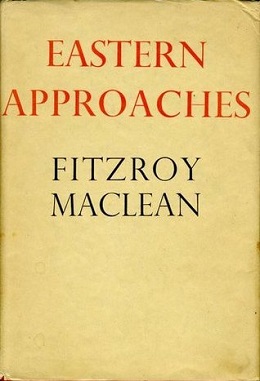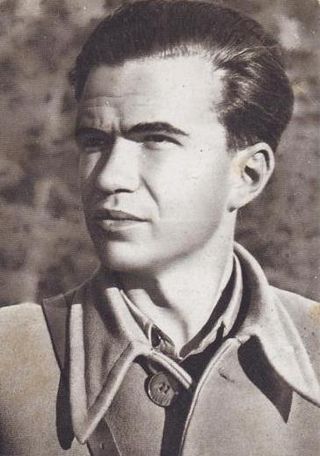Related Research Articles

In Albania, World War II began with its invasion by Italy in April 1939. Fascist Italy set up Albania as its protectorate or puppet state. The resistance was largely carried out by Communist groups against the Italian and then German occupation in Albania. At first independent, the Communist groups united in the beginning of 1942, which ultimately led to the successful liberation of the country in 1944.

The Balkan Air Force (BAF) was an Allied air formation operating in the Balkans during World War II. Composed of units of the Royal Air Force and South African Air Force under the Mediterranean Allied Air Forces command, it was active from 7 June 1944 until 15 July 1945. Air Vice Marshal William Elliot and then George Mills, both RAF officers, were its Air Officer Commanding (AOC).

Case Black, also known as the Fifth Enemy Offensive in Yugoslav historiography and often identified with its final phase, the Battle of the Sutjeska was a joint attack by the Axis taking place from 15 May to 16 June 1943, which aimed to destroy the main Yugoslav Partisan force, near the Sutjeska river in south-eastern Bosnia. The failure of the offensive marked a turning point for Yugoslavia during World War II. It was also the last major German-Italian joint operation against the partisans.

Eastern Approaches (1949) is a memoir of the early career of Fitzroy Maclean. It is divided into three parts: his life as a junior diplomat in Moscow and his travels in the Soviet Union, especially the forbidden zones of Central Asia; his exploits in the British Army and SAS in the North Africa theatre of war; and his time with Josip Broz Tito and the Partisans in Yugoslavia.

Operation Rösselsprung was a combined airborne and ground assault by the German XV Mountain Corps and collaborationist forces on the Supreme Headquarters of the Yugoslav Partisans in the Bosnian town of Drvar in the Independent State of Croatia during World War II. It was launched 25 May 1944, with the goal of capturing or killing Partisan leader Marshal Josip Broz Tito and destroying the headquarters, support facilities and co-located Allied military missions. It is associated with the Seventh Enemy Offensive in Yugoslav history, forming part of the Seven Enemy Offensives historiographical framework. The airborne assault itself is also known as the Raid on Drvar.

Sir Frederick William Dampier Deakin DSO also known as F. W. Deakin, was a British historian, World War II veteran, literary assistant to Winston Churchill and the first warden of St Antony's College, Oxford.
Colonel Duane Tyrell "Bill" Hudson, was a British Special Operations Executive officer who worked as a liaison officer with the Yugoslav Partisans and Chetniks in occupied Yugoslavia during World War II.

Ivan Ribar, known as Ivo Lola or Ivo Lolo, was a Yugoslav communist politician and military leader of Croatian descent. In the 1930s, he became one of the closest associates of Josip Broz Tito, leader of the Yugoslav Communist Party. In 1936, Ribar became secretary of the Central Committee of SKOJ. During World War II in Yugoslavia, Ribar was among the main leaders of the Yugoslav Partisans and was a member of the Partisan Supreme Headquarters. During the war, he founded and ran several leftist youth magazines. In 1942, Ribar was among the founders of the Unified League of Anti-Fascist Youth of Yugoslavia (USAOJ). He was killed by a German bomb in 1943 near Glamoč while boarding an airplane for Cairo, where he was to become the first representative of Communist Yugoslavia to the Middle East Command.
In 1941 when the Axis invaded Yugoslavia, King Peter II formed a Government in exile in London, and in January 1942 the royalist Draža Mihailović became the Minister of War with British backing. But by June or July 1943, British Prime Minister Winston Churchill had decided to withdraw support from Mihailović and the Chetniks he led, and support the Partisans headed by Josip Broz Tito, even though this would result in "complete communist control of Serbia". The main reason for the change was not the reports by Fitzroy Maclean or William Deakin, or as later alleged the influence of James Klugmann in Special Operations Executive (SOE) headquarters in Cairo or even Randolph Churchill, but the evidence of Ultra decrypts from the Government Code and Cipher School in Bletchley Park that Tito's Partisans were a "much more effective and reliable ally in the war against Germany". Nor was it due to claims that the Chetniks were collaborating with the enemy, though there was some evidence from decrypts of collaboration with Italian and sometimes German forces.

Operation Hydra was a failed British attempt during World War II in Yugoslavia to develop contact with the Partisans led by Josip Broz Tito, in Montenegro in February 1942.
Operation Ratweek was a series of coordinated attacks on the Axis forces' communication lines in the Balkans during World War II. Launched on 1 September 1944. the attack was led by the combined operations units of the Yugoslav Partisans, Land Forces Adriatic, the heavy bombers of the U.S. 15th Air Force and the light and medium bombers of the Balkan Air Force.
Operation Bullseye was the code-name of the first Special Operations Executive (SOE) mission to Yugoslavia since its occupation by the Axis forces. It was led by Capt D.T. Bill Hudson with the objective to discover what was happening in Yugoslavia and co-ordinate all forces of resistance there. The mission also included three Royal Yugoslav Army (RYA) officers from Montenegro: Maj Mirko Lalatović, Maj Zaharije Ostojić and Sgt Veljko Dragićević the wireless transmitter (W/T) operator. The group boarded the submarine HMS Triumph in Malta and reached Petrovac on the Montenegrin coast on 20th Sep 1941.

Arthur Terence Atherton was a British journalist, War correspondent and a newspaper proprietor of various English language publications in Belgrade between 1931 and 1941. He was also a British Special Operations Executive intelligence officer for Section D and an espionage agent, both in pre-war Belgrade and during World War II in Yugoslavia. The former journalist led a Commando Mission behind enemy lines during World War II and died in mysterious circumstances.
The Maclean Mission (MACMIS) was a World War II British mission to Yugoslav partisans HQ and Marshal Tito organised by the Special Operations Executive (SOE) in September 1943. Its aim was to assess the value of the partisans contribution to the Allied cause and the means to increase it. It was led by a recently promoted Brigadier Fitzroy Maclean and was the first such mission with full authorization and a personal message from Winston Churchill. His memoir of these years forms the final third of Eastern Approaches (1949).

Peretz Rosenberg was one of the early parachutists of Mandatory Palestine. As the radio operator of special forces leader William Deakin, he was parachuted into Yugoslavia in 1943 on a mission to reach the headquarters of Tito. After World War II, he became head of the clandestine radio service of the Haganah. Rosenberg was the inventor of many agricultural water-saving devices.
Operation Hoathley 1 was one of the two Special Operations Executive (SOE) exploratory missions to the Yugoslav Partisans during World War II. Both Hoathley 1 and the second mission, Operation Fungus, flew out on the night of 20 April 1943 from an airfield Derna, Libya. The missions' objective was to establish who the Partisans were, who their leader was and if and how they could be utilised to further the Allies' military ambitions. They also served as each other's backup, in case one failed to reach the Partisans or fell into the enemy's hands. The mission consisted of three Yugoslav Canadians who were recruited by the SOE and trained in clandestine operations at Camp X on the Lake Ontario, near the US border. It was led by Stevan Serdar who was joined by George Diklić and Milan Družić. They wore no identifiable uniform or rank.
Operation Fungus was one of the two Special Operations Executive (SOE) exploratory missions to Yugoslav Partisans during the World War Two. Both Operation Fungus and the second mission, Operation Hoathley 1, flew out on the night of 20 Apr 1943 from Derna airfield. The missions' objective was to establish who the Partisans were, who their leader was, and whether and how they could be utilised to further the Allies' military ambitions. They also served as each other's backup, in case one failed to reach the Partisans or fell into enemy's hands.
Mission Rogers was a World War II Special Operations Executive (SOE) medical and military expedition to Yugoslav Partisans in Dalmatia, western Bosnia and Slovenia. The group was led by Major Lindsay Rogers and included Sergeant William (Bill) Gillanders RAMC and an RAF Sergeant Ian McGregor. Codenamed "Vaseline" the mission left southern Italy in a Royal Navy submarine and reached the island of Vis in late November 1943.
Mission Davidson was a World War II Special Operations Executive (SOE) military expedition to Yugoslav Partisans led by Basil Davidson, a peacetime journalist, Sergeant William Ennis and a wireless operator Sergeant Stanley Brandreth. Codenamed "Savannah", the mission landed by parachute at Petrovo Polje in central Bosnia on 16 August 1943. They were welcomed by the local British Liaison Officer, Major William Deakin who took Davidson to meet Marshall Tito. Once he explained that his ambition was to get into Hungary, Tito suggested Davidson joins General Kosta Nađ and his troops on their way towards Belgrade.
Mission Lindsay was a World War II Office of Strategic Services (OSS) military expedition to Yugoslav Partisans in Slovenia, sent in May 1944. The group was led by Major Franklin Lindsay and included Lieutenant Gordon Bush, Lieutenant Schraeder - the weather officer, and Corporal James Fisher - the radio operator. It was a part of the wider, Maclean Mission, which arrived in September 1943. The mission left Brindisi airfield in a RAF Halifax bomber and together with cargo of guns, explosives, radios and medical supplies parachuted in Dolenjska, near the village of Semič on 14 May 1944. The fifth member, Corporal Edward Welles, was left behind in Italy in order to assemble the additional equipment that the group would ask for, once they had arrived to Slovenia. Eventually, he joined them in mid-August.
References
- ↑ Deakin, pp. 216-217
- ↑ Maclean, pp. 320-322
- ↑ Deakin, p. 217
- ↑ Deakin, p. 218
- ↑ Deakin, p. 19
- ↑ Deakin, p. 23
- ↑ Deakin, p. 59
- ↑ Deakin, pp. 108-111
- ↑ Deakin, p.116
- ↑ Deakin, p. 234
- ↑ Deakin, p. 236
- ↑ Deakin, p. 241
- ↑ Maclean, p. 320
- ↑ Maclean, p. 382
- ↑ Maclean, pp. 383-391
- ↑ Maclean, pp. 394-397
- ↑ Deakin, pp. 249-253
- ↑ Maclean, pp. 398-399
- ↑ Deakin, pp. 257-259